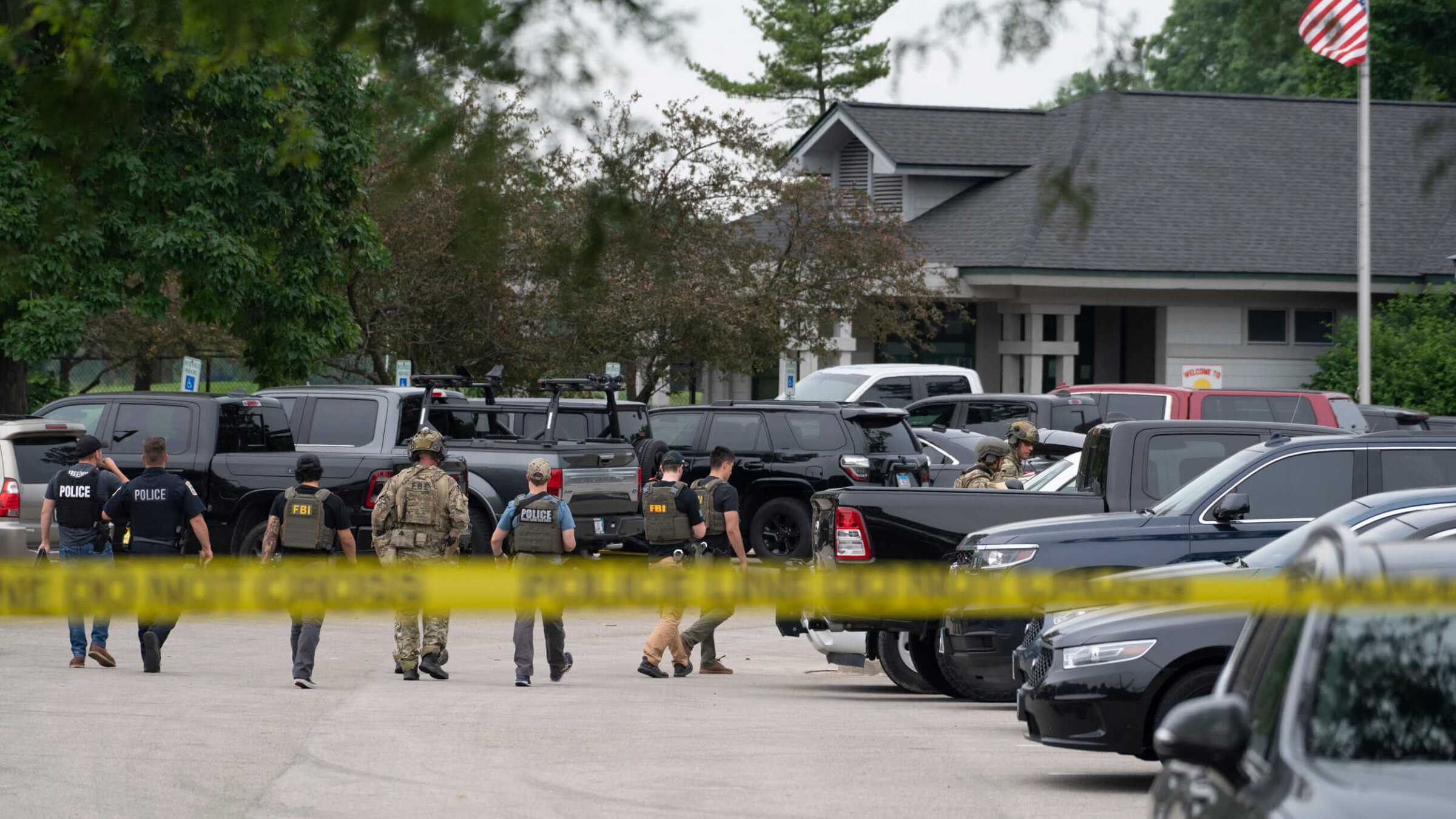‘We’re living in an imperfect world’: Highland Park rabbi speaks out after mass shooting
An attack at a July 4 parade in the heavily Jewish northern Chicago suburb killed 6 and injured dozens

Law enforcement officers at the scene of a July 4 parade shooting in Highland Park, Illinois. Photo by YOUNGRAE KIM/Getty Images
This story has been updated to reflect new information about the number of casualties in the Highland Park mass shooting.
When his wife called to tell him about the active shooter two blocks east of his synagogue, Rabbi Yosef Schanowitz raced outside to shepherd in four teenage boys who were preparing the Chabad booth for Highland Park’s July 4th parade.
The parade was scheduled to file past the synagogue on Central Avenue.
Once inside, the boys told Schanowitz that they had heard sirens and seen racing police cars. But, he said, they did not yet know that a gunman had opened fire on the parade, killing at least seven and injuring at least two dozen in the affluent suburb north of Chicago, which is home to a significant number of Jews.
Several hours after the shooting, Robert E. Crimo III, 22, was taken into custody.
Schanowitz told the boys to stay put and call their parents. He then drove five minutes to the Highland Park Hospital, where he had volunteered as a chaplain before the pandemic, and walked into the emergency room.
“You have to do what you have to do,” said Schanowitz, 66. “I thought I should at least make sure that there’s clergy on the premises.”
“There was chaos,” he said — not just because of physical injuries. “There was an overload of unexpected trauma.”
A nurse suggested he go from room to room, and he began to introduce himself. “I told them I was clergy and I wished them all the best.” Respecting privacy, he did not ask anyone about their faith.
“Most of the people I saw were not of the Jewish faith,” he said. “There were a few who were.”
To himself, as he made the rounds, he said the sh’ma.
After about an hour, with the gunman still on the loose, the Brooklyn-born Schanowitz began to drive back to his synagogue, where he has been the rabbi since 1980, and took a call from the Forward.
Did he have any words for those teenage boys, a 16-year-old and three 17-year-olds, whom he had helped to safety in the synagogue?
“It just drives home that we’re living in an imperfect world, and we have work to do,” Schanowitz said.
The boys, it turned out, had flown back home to Chicago Monday morning from New York, where they had gone to mark the yahrzeit of Rabbi Menachem Schneerson, the Lubavitcher Rebbe, and arrived in Highland Park in time for morning prayers, and to help the synagogue prepare its booth for a parade, from which they had planned to distribute literature and encourage other Jews to lay tefillin.
One of the boys, Dovber Yarmove, 17, said one of their parents suggested they leave the synagogue and run to the home of a member of the shul who lived nearby, but farther from the parade route.
The four were continuing to shelter at that home in the hours after the shooting. Yarmove said it made him recall a lesson he learned when he was younger, about how to care for trees, and how they must grow straight when they’re small, because flaws will only be magnified when they get bigger. It’s the same with people who turn to violence, he said.
If you teach kids that their real mission in life is to bring loving, kindness and happiness into the world, he said, “you won’t come to this.”
A message from our CEO & publisher Rachel Fishman Feddersen
I hope you appreciated this article. Before you go, I’d like to ask you to please support the Forward’s award-winning, nonprofit journalism during this critical time.
We’ve set a goal to raise $260,000 by December 31. That’s an ambitious goal, but one that will give us the resources we need to invest in the high quality news, opinion, analysis and cultural coverage that isn’t available anywhere else.
If you feel inspired to make an impact, now is the time to give something back. Join us as a member at your most generous level.
— Rachel Fishman Feddersen, Publisher and CEO